Crude Conversations
”Crude Conversations” features guests who represent a different aspect of Alaska. Follow along as host Cody Liska takes a contemporary look at what it means to be an Alaskan. Support and subscribe at www.patreon.com/crudemagazine and www.buymeacoffee.com/crudemagazine
Episodes
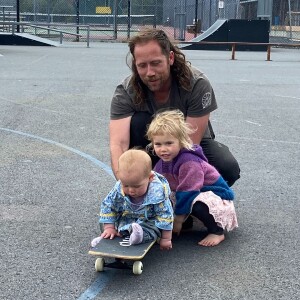
Wednesday Jan 31, 2024
EP 146 Searching for understanding and forgiveness with Robert Stark
Wednesday Jan 31, 2024
Wednesday Jan 31, 2024
In this one, Cody talks to Robert Stark. He’s a former army infantryman and the author of Warflower, a book about his upbringing in Alaska and his time in the military. His upbringing was a turbulent one — his dad was absent, his mom struggled with addiction, his brother spent time in prison and his step-dad is serving life in prison for murder. He says he was known as the kid with the family of degenerates — people who drank alcohol, did drugs, stole, and went to prison. Eventually, he found himself struggling with his own alcohol and drug problem. So, he joined the army to travel and to learn more about himself. It was a part of his life that altered his way of thinking and understanding of the world.
It’s been 20 years since he served in Iraq, and he says he’s still working through it. He talks about an experience when one of his fellow infantrymen shot and killed an Iraqi man under questionable circumstances. It was a moment that made him start questioning everything — what were they really fighting for, and how was this man’s act so much different than the one that put his step-dad in prison for life? There was so much to work through after finishing his military service — on top of his family history, he was now thinking about the fog of war. So, he found himself dissociating from his memories and isolating himself for days at a time, smoking weed and drinking.
It took him years to step away from his substance abuse and to gain some clarity and accept the things he had seen and the things that he had done. He spent some time in India and Nepal doing yoga retreats and meditations. He would sit there and visualize the situations he struggled to understand — he would work through them as if he were the people acting them out and then he would embrace them with love and understanding of what led them to making the decisions they made. It’s a technique that helped him understand what he didn’t understand.
Today, in times of personal crisis, he regains his equilibrium by going on walks on his property in Happy Valley, Alaska. Peaceful walks in the woods, among the trees and the birds and the mountains in the distance. He thinks of his wife and his daughters and the man he wants to be — loving, dependable and present.
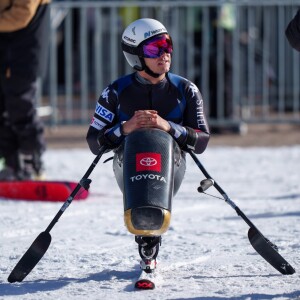
Wednesday Jan 17, 2024
EP 145 There is no excuse with Andrew Kurka
Wednesday Jan 17, 2024
Wednesday Jan 17, 2024
In this one, Cody talks to Paralympic sit-skier Andrew Kurka. From the very beginning, he was pushing his limits. He was the first sit-skier to ride down Christmas Chute at Alyeska, an in-bounds run with a 45-degree pitch that narrows to about 15-feet. And he’s never been afraid to get hurt. He’s broken his back, his ankles, his wrists, ribs, arm, femur. For him, fear doesn’t factor into his process. When he’s pushing out of the gate at a competition, for example, he’s focused on what he needs to do to win. He’s prepared himself for these moments, so that there are as few surprises as possible. It’s the reason he’s achieved gold medals at the Winter Paralympics, the World Championships and the World Cup. But it took time for him to get to where he’s at right now. He’s always been naturally talented, but he needed to learn how to nurture and develop that talent; He needed to learn how to temper his passion. Among others, he credits Challenge Alaska with not only introducing him to sit-skiing, but helping him realize his potential.
So much of his spirit and his determination comes from the ATV accident that rendered him a paraplegic. He was 13 when it happened, and he says it was the worst thing he could have imagined — going from being a champion high school wrestler to losing the use of his legs. But as time went on, he learned to adapt and the trajectory of his life changed course. He would continue to wrestle for a few more years before getting into sit-skiing.
Years later, trauma visited him again. When he made his first Paralympic games in Sochi, Russia he crashed and broke his back off the first jump. Not long after that, he broke his femur after being hit during training. He says that it was after this last injury — the broken femur — that he learned about the mental and emotional aspect of growth, that just because you failed doesn’t mean you’re a failure. Now, with all the failures and the successes he’s experienced, he looks back on his ATV accident as a learning experience because it made him who he is today.
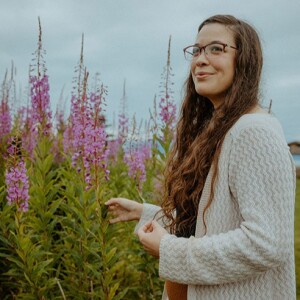
Sunday Jan 07, 2024
EP 144 Deconstructing the myth of The Last Frontier with Kaitlin Armstrong
Sunday Jan 07, 2024
Sunday Jan 07, 2024
In this one, Cody talks to Kaitlin Armstrong. She’s the host of The Alaska Myth, a podcast that deconstructs the stories created during the Russian settlement and European colonization of Alaska that began in the mid-1700s. Utopian settler stories, stories of the rugged outdoors, ones of monetary opportunity and ones of lawlessness. These stories — often embellished or completely fabricated — have informed the Alaskan identity and sense of place for generations. Meanwhile, overlooking or ignoring the history and the lifeways of the many Alaska Native cultures. Kaitlin says that she’s been thinking about all of this for years, about how the idea of The Last Frontier is subtle and insidious because of what it hides. On the surface, these stories are ones of can-do spirit and gritty individualism, stories that reinforce our idea of Alaskan pride. But underneath all of that, there’s violence, resource extraction and the erasure of Native peoples and their cultures.
Kaitlin grew up in Homer, Alaska. There, she says she had an idyllic upbringing in the small, tight-knit community. But her understanding of what goes into creating this idyllic place changed over the years. That the land had to be conquered first and then it could be made into the place she grew up in. That knowledge and curiosity extended to her own Honduran heritage, of which she knew little about as a kid. Because, for so long, it was just too difficult for her mom to talk about. But every summer, Kaitlin’s grandma would visit and she would connect with her heritage through her. But, Kaitlin says, she always felt more Alaskan than anything else.
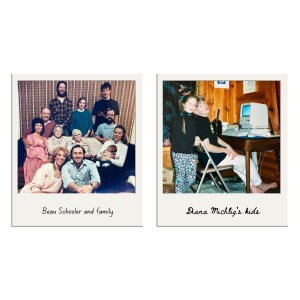
Wednesday Dec 20, 2023
EP 143 A Christmas they’ll never forget
Wednesday Dec 20, 2023
Wednesday Dec 20, 2023
In this one, Cody talks to two Alaskans about Christmases they’ll never forget. The first story comes from Beau Schooler. In 1990, he was living in Big Lake when his family was awarded a moose from the Alaska Roadkill Salvage Program. At the time, Beau’s family didn’t have much money, so the moose provided them with a hearty Christmas dinner, as well as meat that lasted them throughout the winter. It was an experience that would eventually add to Beau’s decision to become a chef.
The second story comes from Diana Michlig. It’s about getting stuck behind an avalanche on the Seward Highway, back in 1988, just a few miles away from her home in Girdwood. She had recently gotten stuck behind another avalanche about a month before. That time, she had to stay the night in her car. So, this second time, she was determined not to do that again. Because if she did, she would miss Christmas with her kids. So, she waded her way through the avalanche, singing Christmas carols along the way.
A Christmas story is rarely ever just a story about Christmas. It’s about the festivities, sure, but it’s also about family, friends and perseverance. Getting together and making Christmas happen regardless of weather or money. This is especially true in a place like Alaska.
Christmas music courtesy of Michele McLaughlin
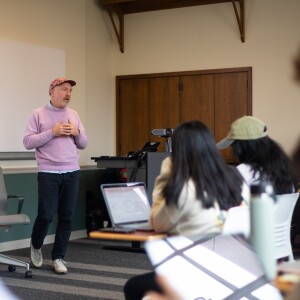
Wednesday Dec 13, 2023
EP 142 The history of slime with Christopher Michlig
Wednesday Dec 13, 2023
Wednesday Dec 13, 2023
In this one, Cody talks to Christopher Michlig. He’s a visual artist and a professor at the University of Oregon, and he recently released a book titled "File Under: Slime." In it, he traces the origins of the idea of slime back to the early 1900s, with associations to ectoplasm, femininity, and sexuality. In his research, he found that people like HP Lovecraft and John Paul Sartre helped solidify the concept of slime within philosophy and pop culture, paving the way for it to be an analog, or a proxy, for describing the unknown. In the 1950s, for example, there were movies like "The Blob," representing the social anxiety surrounding the atomic bomb. And then in the 1980s — with movies like "The Stuff," "Street Trash," and "The Toxic Avenger" — slime represented a fear of toxicity or the handling of toxic waste. Christopher says that what we choose slime to represent evolves over time. More recently, it has entered rap music through artists like N.O.R.E, from Capone-N-Noreaga, and newer guys like Young Thug. The way these rappers are using the word “slime” is different than how it’s been used in the past. It’s positive, it’s a substitute for friend or homie.
Christopher grew up in Girdwood, Alaska, in the ‘80s. He remembers it being a small town back then, maybe about 400 to 500 people. It’s a place that instilled in him the idea of closeness and the importance of a supportive community, sentiments that continue to inspire and influence him. Recently, he’s been doing research on different Aleutian communities, trying to get a better grasp on his family history. He has roots, on his dad’s side, in the Aleutian Islands, before the Russian fur trade. He says it’s been a difficult process, that it’s confusing for him because of the complicated history of Aleutian communities as a result of colonialism and the displacement that occurred during and after World War II. How people who had been living in a place for generations were forced to upend their ancestral ways of living. So, he tries to imagine — even project himself — to the time of his ancestors on the Island of Unga. Without much oral history from his own family to go off of, his research is helping him better understand where he comes from.
PHOTO / Ilka Sankari

Friday Nov 24, 2023
EP 141 What we’ve been through is not who we are now with Travante Williams
Friday Nov 24, 2023
Friday Nov 24, 2023
In this one, Cody talks to professional basketball player Travante Williams. He says that everything in his life started with the environment he grew up in, in East Anchorage. There was good and there was bad. However, at times, the bad seemed to overshadow the good. His family, and many other people he grew up around and even looked up to, struggled with addiction and were in and out of prison. So, he had a fear of falling into that same cycle. A few people took him out of that mindset though. One was his mom. She always instilled in him a sense of his potential. Even throughout her own troubles, she made sure he knew he was loved and meant for better things. The other person was his grandmother. She was the most instrumental part of his life, Travante says. Every moment he was around her, she made him feel at home. To this day, her love and influence reminds him of all the work you need to put in to have anything that’s worth having.
His path to playing pro basketball has been one of perseverance, luck and opportunity. He tells this story from his college days that encapsulates all of this. He was working at a 24-Hour Fitness and he noticed these guys running the court during his lunch break. So he got in there and started showing everyone up. Meanwhile, a scout for San Francisco City Junior College was watching him. So afterwards the scout approached Travante and got his number. Six or seven months later, Travante was offered a position on the team.
For the last seven years, he’s been living overseas and playing pro ball. He started his career in Tskaltubo, a city in the country of Georgia. Then he moved to Portugal, first playing for U.D. Oliveirense and then Sporting de Portugal. He says that, as a teammate, he has what he calls a dishwasher mindset. He likes to do the dirty jobs and he likes to work hard. That’s his way of leading by example. He tries to connect with all his teammates because, at the end of the day, this is a job and when one of them succeeds, they all succeed.
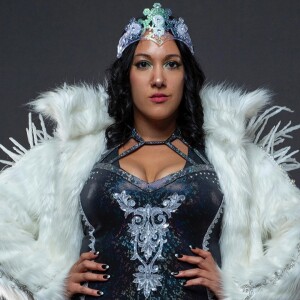
Saturday Nov 11, 2023
EP 140 From middle school teacher to pro wrestler with Freya the Slaya
Saturday Nov 11, 2023
Saturday Nov 11, 2023
In this one, Cody talks to professional wrestler Sarah States, better known as Freya the Slaya. She says that she’s always gone by Freya, that her wrestling character, or gimmick, started out as more of a viking and then it transitioned to an Arctic Amazonian woman — tall, strong and assertive. The Queen of the North. And it all started in Palmer, Alaska. She’s from Fairbanks, so she would have to drive six hours to Palmer to do shows in places like train depots. The shows were small, like the Alaska wrestling scene at the time, and more often than not they were performing in front of families. It was fun, an entertaining hobby while Freya was also working as a middle school teacher. She loved teaching, but she encountered too many roadblocks in her work. Resources were always limited and her empathic nature predisposed her to wanting to do more for her students. Years of this took its toll on her mental health, until one day she decided to quit her job, sell her house and move to the states. There, she threw her whole self into becoming a pro wrestler.
She says that, more and more, she’s becoming her character. That her full-time job is being Freya the Slaya, even outside of the ring.
She’s training, doing interviews, working on her merch store, making social media posts, she’s on Cameo. And this personality swap, it’s in her benefit. When she’s in the ring, for example, and she’s on live TV, where so much of the performance is improvisational, it’s easier to react naturally to the violent soap opera happening all around her. That’s what continues to draw her to pro wrestling, the physical and emotional rollercoaster of it all. And how it affects its audience, that when it’s done successfully and powerfully you can see it take people away from their every day troubles and immerse them into this fantastical world of wrestling.
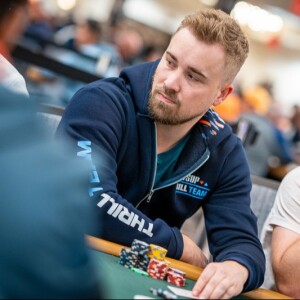
Friday Nov 03, 2023
EP 139 Embracing the variance of poker with Adam Hendrix
Friday Nov 03, 2023
Friday Nov 03, 2023
In this one, Cody talks to professional poker player Adam Hendrix. He learned to play poker when he was a kid, at his grandma’s house in Homer, Alaska. Every time he would visit, he’d play penny poker with his aunts and uncles, but what really got him interested in it was the first time he watched the ESPN World Series of Poker Main Event coverage. It was filled with these unique characters — boisterous and stone-faced — sometimes wearing funny hats, headphones, sunglasses or costumes. It was a career unlike any he’d ever heard of before.
Fast forward to college and he’s playing $5 poker games in his dorm at Virginia Tech. There, he had a solid group of friends he’d play with. Sometimes they would travel to play poker too, they’d go to places like Atlantic City where they would play until all their chips were gone. Some days they would do better than others. Poker’s unique in that way, Adam says, if you can afford the buy-in, then you can play. And because of that, you get so many different people — from beginners to experts — that come to the table every day.
He says that his upbringing contributed to his worldliness and his understanding of people — both of which are essential qualities in a poker player. His dad worked in oil, so his family traveled a lot, living in a number of different states and countries. In high school, he lived in Egypt. It was an experience that introduced him to a lot of different people and cultures. Looking back on it now, he says that his time in Egypt made him the poker player he is today. Because, after all, poker is also a game of psychology. The better you can read people, the more formative a player you’ll be.
Photo courtesy of Omar Sader
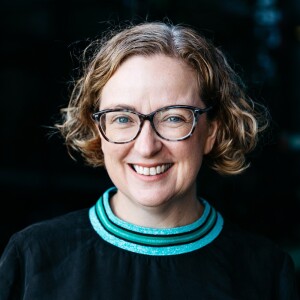
Wednesday Oct 25, 2023
Wednesday Oct 25, 2023
Kristin Alford is a futurist and the director of the Museum of Discovery, or MOD., in South Australia. She says that MOD.’s main objective is to showcase innovative research that imagines multiple futures. This idea of imagining multiple futures involves anticipating where society and nature might be headed based on past and current trends. She says that it’s about understanding and recognizing opportunities, risks and downsides, and then thinking about the unintended consequences or possible actions that can be taken. In showcasing these futures, MOD. hopes to inspire young people to learn more about where technology, ethics and social issues might be headed so that they can make better decisions for their own futures.
When putting together an exhibition, one of MOD.’s main tenants is for people to leave with a feeling of hope, not one of anxiety or depression. Because these are big issues they’re tackling — populating other planets, climate change, the future. Next year, they’re opening an exhibition called Broken, about the general feeling of anxiety and ambivalence about the future. In order to instill hope in this exhibition, people are asked a series of questions based on psychologist Charles Snyder’s Elements of Hope: “Do you have a positive vision of the future that brings you forward?” “Do you feel positive about that vision?” “Do you feel like you have agency to make a difference?” And, “Are there multiple pathways for you to reach your goal?”
In this Chatter Marks series, Cody and co-host Dr. Sandro Debono talk to museum directors and knowledge holders about what museums around the world are doing to adapt and react to climate change. Dr. Debono is a museum thinker from the Mediterranean island of Malta. He works with museums to help them strategize around possible futures.
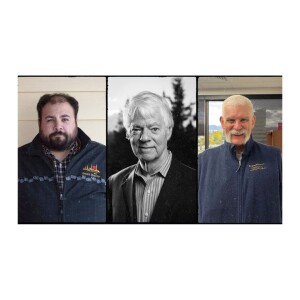
Sunday Oct 15, 2023
Sunday Oct 15, 2023
The premise of this conversation is based on a question that Aaron Leggett — the president of the Native Village of Eklutna and the Senior Curator of Alaska History and Indigenous Culture at the Anchorage Museum — and Cody are curious about: What happens to Alaska when oil is no longer economically viable for the economy of the state? Aaron says that his hope for the future is that people will have a better understanding about the role oil plays in Alaska, that although production is in decline we can take the wealth that’s been created with it and invest it into Alaska’s education system in order to prepare future generations for the new realities and challenges that await them.
Permanent Fund Dividend co-creator and state legislator Cliff Groh says that, for decades, oil has been the primary driver of Alaska’s economy and fiscal system. However, oil production has been in decline for about 35 years. In the late 1980s, the state had more than 2 million barrels of oil going through the Trans-Alaska Pipeline System every day. Today, it’s well under 500 thousand barrels a day. Right now, many people are betting the economic future of Alaska on finding another Prudhoe Bay oilfield. There’s the Pikka Oil Field, the Willow Project, and the Arctic National Wildlife Refuge, or ANWR. There are arguments for and against each of these projects.
Tim Bradner has been writing about Alaska’s natural resources since 1966, he’s also the co-owner of the Alaska Legislative Digest. He doesn’t believe oil in Alaska will ever completely go away because oil fields have a way of producing for decades, but oil will become less and less important to Alaska’s economy. Ultimately, he’s hopeful for the future, though, that there are other things that will come along to stimulate the economy. Commercial fishing and tourism, for example. He says that if we’re smart, we’ll use the Permanent Fund to sustain our public services and diversify the economy, meanwhile educating young people and giving them a reason to stick around.





